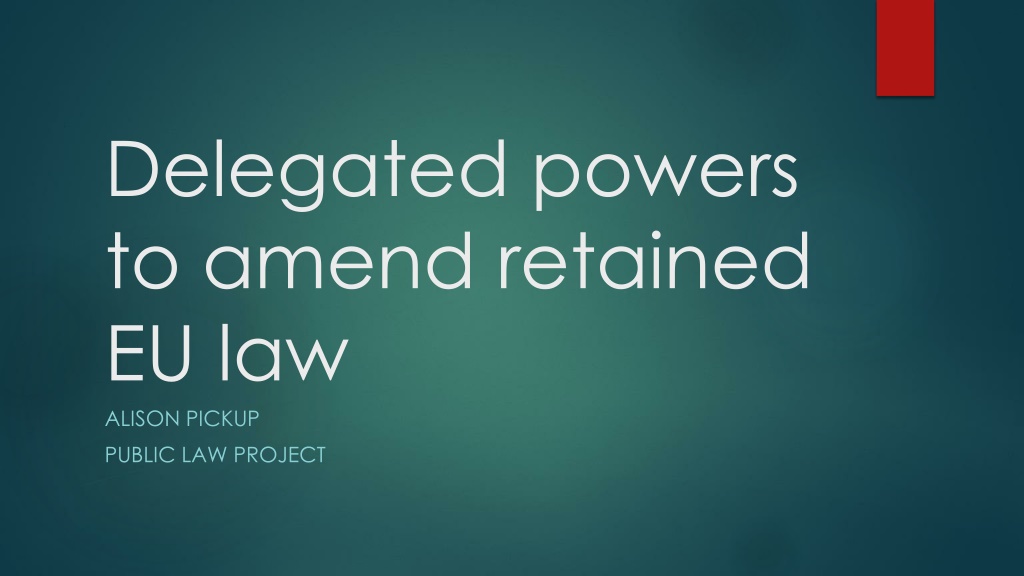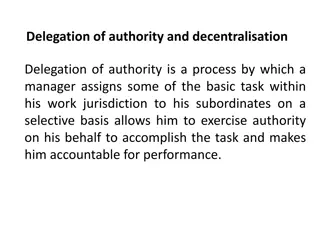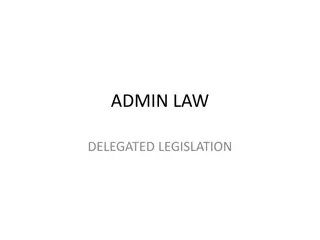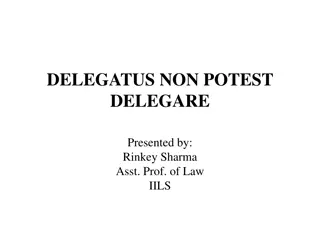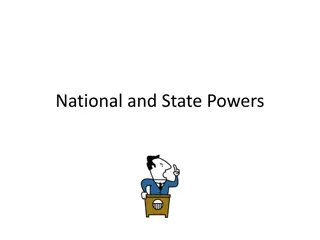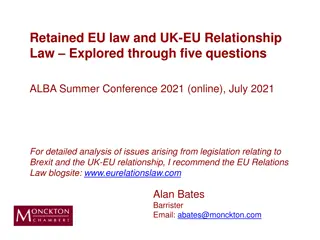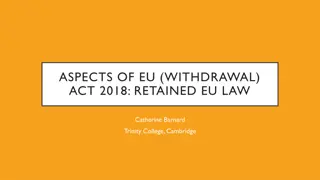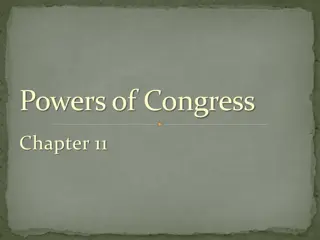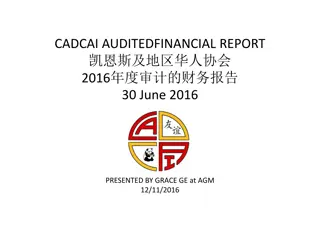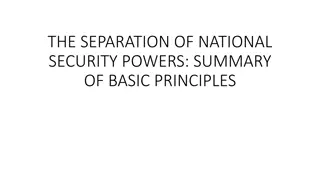Delegated Powers to Amend Retained EU Law by Alison Pickup
The UK's decision to leave the EU was driven by a desire for sovereignty and control of its laws. The Great Repeal Bill aimed to smoothly transition EU laws into domestic legislation while providing the government with powers to address deficiencies in retained EU law post-Brexit. The bill includes provisions to prevent failures in retaining EU law and specifies restrictions on policy changes. Deficiencies are defined as anything needing correction for effective operation post-EU withdrawal.
Download Presentation

Please find below an Image/Link to download the presentation.
The content on the website is provided AS IS for your information and personal use only. It may not be sold, licensed, or shared on other websites without obtaining consent from the author.If you encounter any issues during the download, it is possible that the publisher has removed the file from their server.
You are allowed to download the files provided on this website for personal or commercial use, subject to the condition that they are used lawfully. All files are the property of their respective owners.
The content on the website is provided AS IS for your information and personal use only. It may not be sold, licensed, or shared on other websites without obtaining consent from the author.
E N D
Presentation Transcript
Delegated powers to amend retained EU law ALISON PICKUP PUBLIC LAW PROJECT
At the heart of that historic decision [to leave the EU] was sovereignty. A strong, independent country needs control of its own laws. That, more than anything else, was what drove the referendum result: a desire to take back control. That process starts now. But taking back control does not require us to change everything overnight and we will not do so. Rather, we will provide for a smooth and orderly exit. The Great Repeal Bill will convert EU law as it applies in the UK into domestic law on the day we leave so that wherever practical and sensible, the same laws and rules will apply immediately before and immediately after our departure. It is not a vehicle for policy changes but it will give the Government the necessary power to correct or remove the laws that would otherwise not function properly once we have left the EU. Rt Hon David Davis MP, (then) Secretary of State for Exiting the European Union, Foreword to the White Paper, Legislating for the United Kingdom s withdrawal from the European Union , March 2017
Copy and paste: the basic policy Close the gate through which EU law flows into to the UK: s1 EU(W)A 2018 repeals the ECA 1972 on exit day Preserve domestic implementing measures (broadly defined EU- derived domestic legislation): s2 EU(W)A 2018 Take a snapshot of EU law immediately before exit day and incorporate as a new category of retained EU law : direct EU legislation : s3 EU(W)A 2018 EU-derived rights, powers, liabilities etc: s4 EU(W)A 2018 Principles and decisions made in domestic and CJEU cases before exit day on the interpretation of the above: s6 EU(W)A 2018 Including recognised general principles: s5 and Sch 1, para 2
Tweak to make it work: s8(1) A power to make (s8(1)): such provision as the Minister considers appropriate to prevent, remedy or mitigate (a) any failure of retained EU law to operate effectively, or (b) any other deficiency in retained EU law, arising from the withdrawal of the United Kingdom from the EU. Crucially, we will ensure that the power will not be available where Government wishes to make a policy change which is not designed to deal with deficiencies in preserved EU-derived law arising out of our exit from the EU. (Legislating for the UK s Withdrawal from the EU, para 3.17)
What is a deficiency? S. 8(2) list of deficiencies (note amendment by EU(WAg)A 2020) S. 8(3)(a) anything of a similar kind S. 8(3)(b) power to make regulations specifying other kinds of deficiencies S. 8(7) explicit restrictions on how the power may be used Sch 7, para 22 power includes re-stating any retained EU law, in a clearer or more accessible way
Some trends in Brexit SIs to date Over 600 Brexit SIs to date Minimal consultation less than 10% subject to any form of consultation, and only around 9 had a full, formal consultation Multiple errors use of wash up SIs to correct errors made in earlier errors around 65 such SIs Inadequate explanatory material Absence of impact assessments SIs being used to make significant policy changes, e.g.: Freedom of Establishment and Free Movement of Services (EU Exit) Regulations 2019 drawn to the special attention of the house by SLSC and subsequently House of Lords voted to regret See further A. Sinclair & J. Tomlinson Brexit Delegated Legislation: Problematic Results UKCLA blog, 9 January 2020
Scrutiny of powers Schedule 7 establishes a novel sifting mechanism Some s8 SIs must be affirmative (Sch 7, para 1(2)): Create or widen the scope of a criminal offence Create or amend a power to legislate Provide for a legislative function to be exercisable by a UK public authority Relate to a fee in respect of a function exercisable by a UK public authority Others may be subject to the negative resolution procedure BUT if so must go through the sift first
Sifting procedure: Sch 7 paras 3 & 17 Applies to proposed negative SIs made under ss8, 9 and 23 Draft SI laid before both Houses of Parliament with memorandum justifying use of negative procedure Scrutiny by European Statutory Instruments Committee (Commons) and Secondary Legislation Scrutiny Committee (SLSC) within 10 sitting days Recommendation for upgrade if consider should be subject to affirmative procedure Equivalent procedure for Welsh instruments in devolved areas involving scrutiny by committee of National Assembly for Wales Urgent case procedure using made affirmatives which are then not subject to the sift
The sifting mechanism in numbers Since July 2018, nearly 250 Brexit SIs have been laid as proposed negatives so subject to sift Over 70 recommended for upgrade by either (or both) ESIC and SLSC All upgrade recommendations have been accepted by the Government ESIC focuses on whether the proposed instrument is either legally or politically important, or significant enough to warrant further consideration ESIC public engagement tool: https://esic-parliament.uk/
The sifting mechanism in practice Transmissible Spongiform Encephalopathies and Animal By-Products (Amendment, etc) (EU Exit) Regulations 2018 Removed a statutory duty to ensure staff had appropriate education and training in relation to checks for TSE Subject to the sift and recommended for upgrade by the SLSC because of this omission Recommendation accepted and re-laid as affirmative with the statutory duty reinserted
Legal challenges to Brexit SIs The Plant Protection Products (Miscellaneous Amendments) (EU exit) Regulations 2019 Removal of blanket ban on hormone disrupting chemicals in pesticides Prohibition reinstated after ChemTrust sent pre-action protocol letter The Conservation of Habitats and Species (Amendment) (EU Exit) Regulations 2019 and The Conservation (Natural Habitats, etc.) (Amendment) (Northern Ireland) (EU Exit) Regulations 2019 Judicial review brought by ClientEarth and the Marine Conservation Society of changes to the Natura 2000 framework Permission refused by Lieven J on grounds that premature The Cross-border Trade (Public Notices) (EU Exit) Regulations 2019 Regulations which would have created a sub-delegated power to legislate by public notice withdrawn after PAP sent by PLP
EU (Withdrawal Agreement) Act 2020 Contains 19 delegated powers, many of which are Henry VIII powers Instead of requiring SIs to make technical amendments to retained EU law, s1B provides for glosses to EU derived domestic legislation so that e.g. any reference to EU citizens is to be read as including UK nationals Amends ss2-4 and 6 EUWA so that the snapshot is taken immediately before IP completion day Blanket amendment of Brexit SIs to come into force on IP completion day rather than exit day (subject to power to make specific provision)
Delegated powers in EUWA 2018 after the 2020 Act Section 8 amended to increase the scope of the power to correct deficiencies in retained EU law New section 8A power to: Modify the effect of s1B (glosses) on the interpretation of particular pieces of EU- derived domestic legislation Amend any part of the Act in consequence of the repeal of ss1A and 1B on IP implementation day Make such other provision as the Minister considers appropriate to give effect to Part 4 of the Withdrawal Agreement New section 8B power to make provision to implement part 3 WA (other separation issues) New section 8C power to implement the Protocol on Ireland/Northern Ireland New power to make regulations empowering lower courts and tribunals to depart from CJEU caselaw (s26 EU(WAg)A 2020 inserting new s6(5A) EUWA)
Delegated powers in EU(WAg)A some themes Use of such provision as the Minister thinks appropriate Constrained by the Withdrawal Agreement to extent that intended to implement the powers Not subject to the sifting mechanism in EUWA Changes to primary legislation and retained direct principal EU legislation require affirmative Otherwise many powers exercisable by negative resolution either generally or after first use Extension of sunset clauses in EUWA to 2 years after IP implementation day
